2022届高三英语复习倒装句课件(82张ppt)
文档属性
| 名称 | 2022届高三英语复习倒装句课件(82张ppt) | 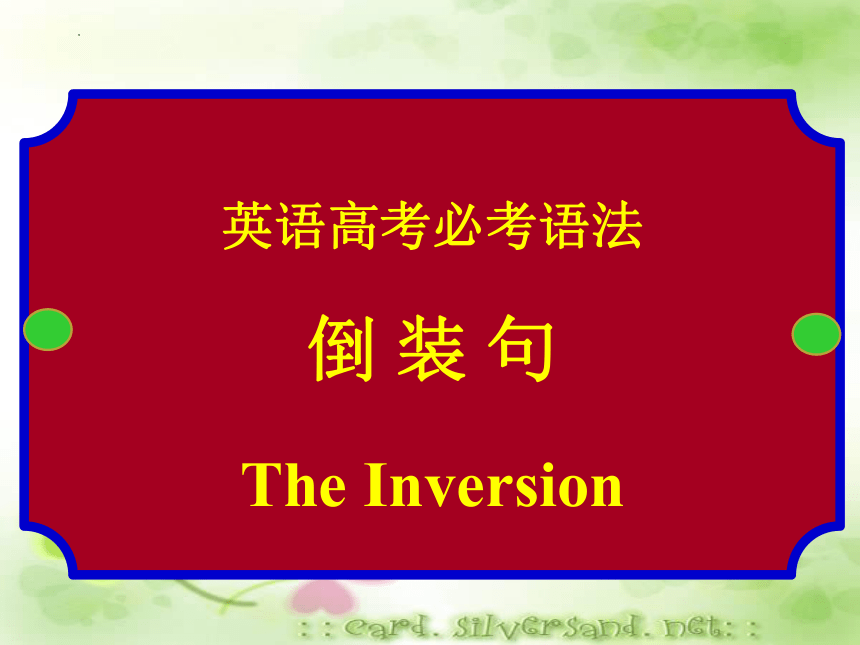 | |
| 格式 | zip | ||
| 文件大小 | 404.1KB | ||
| 资源类型 | 教案 | ||
| 版本资源 | 通用版 | ||
| 科目 | 英语 | ||
| 更新时间 | 2022-05-31 16:40:17 | ||
图片预览

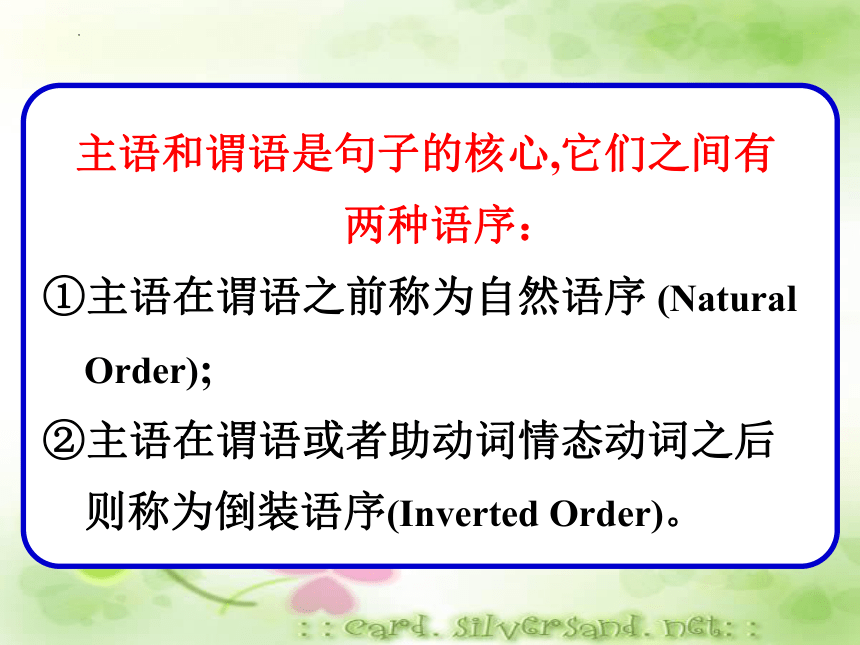
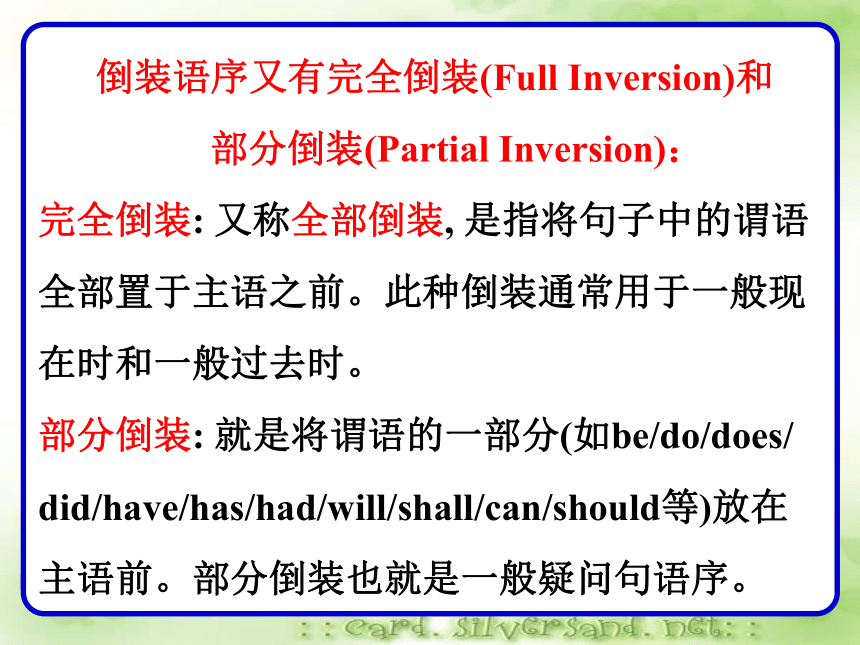
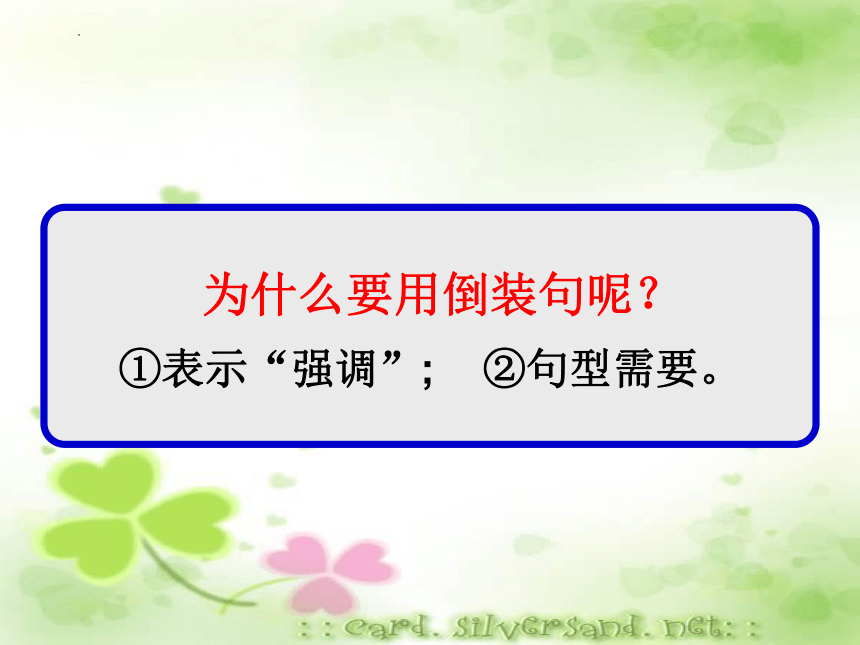
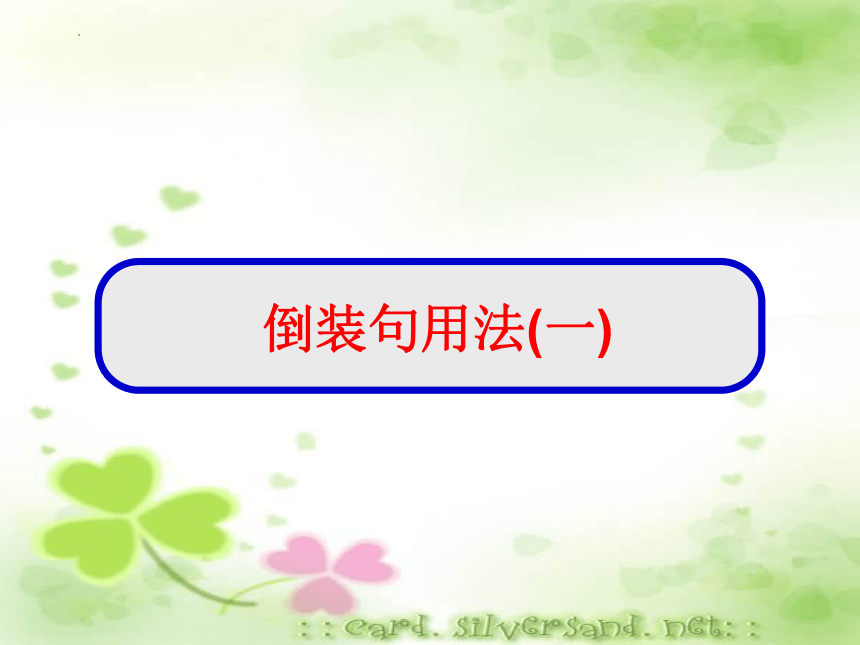
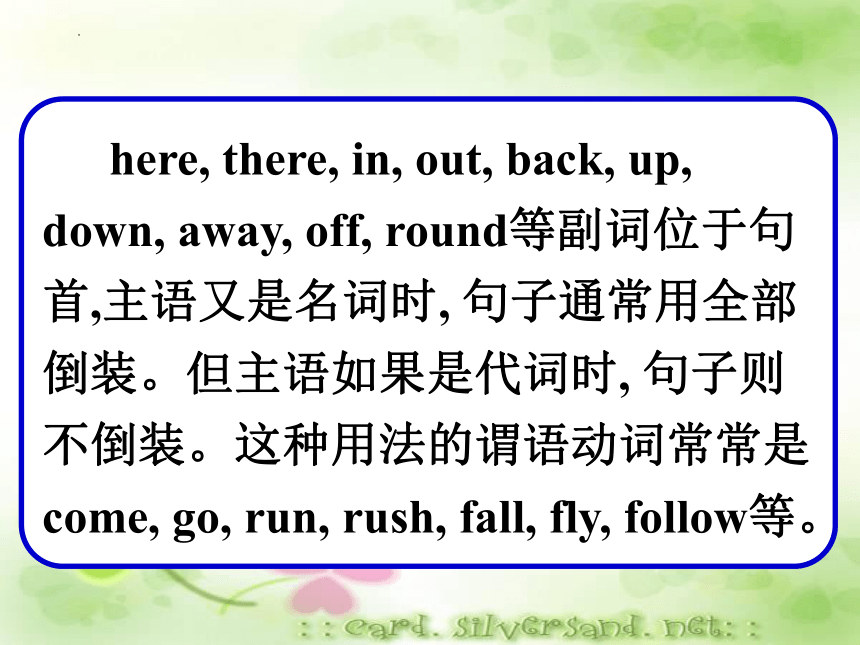
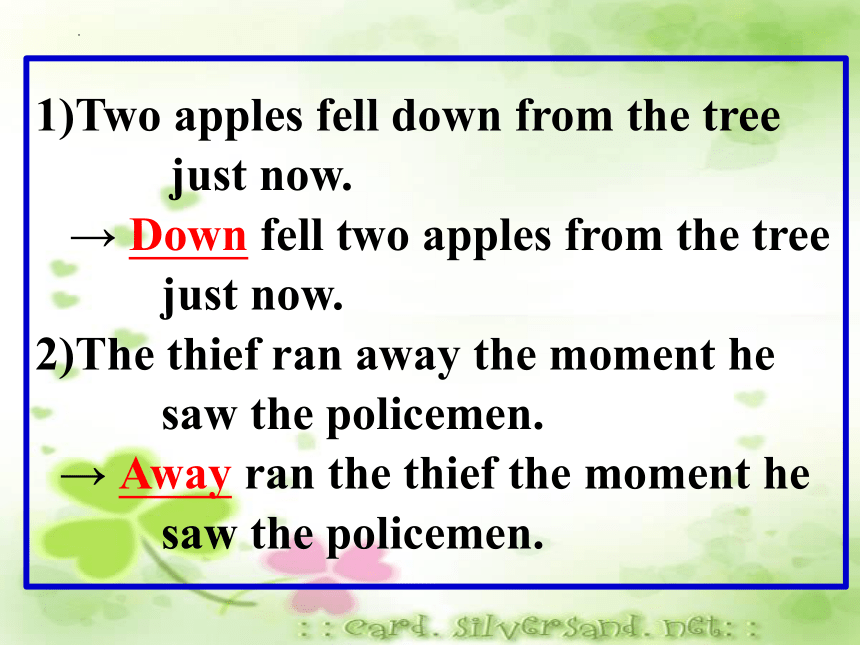
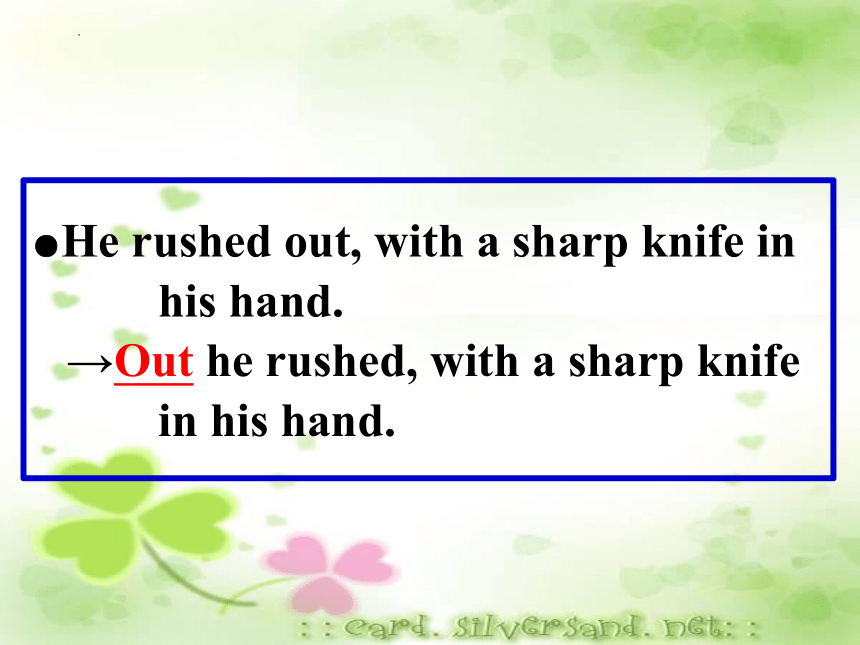
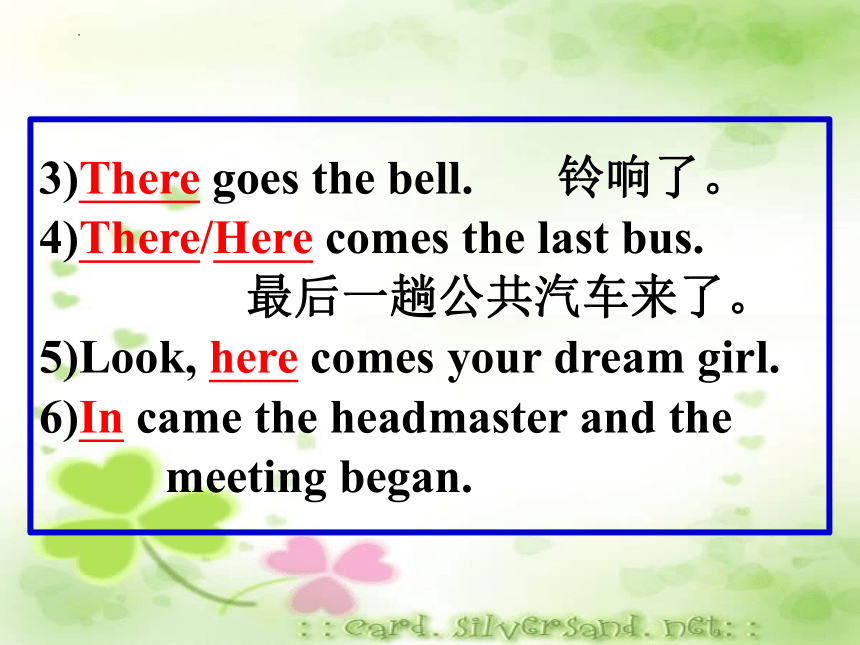
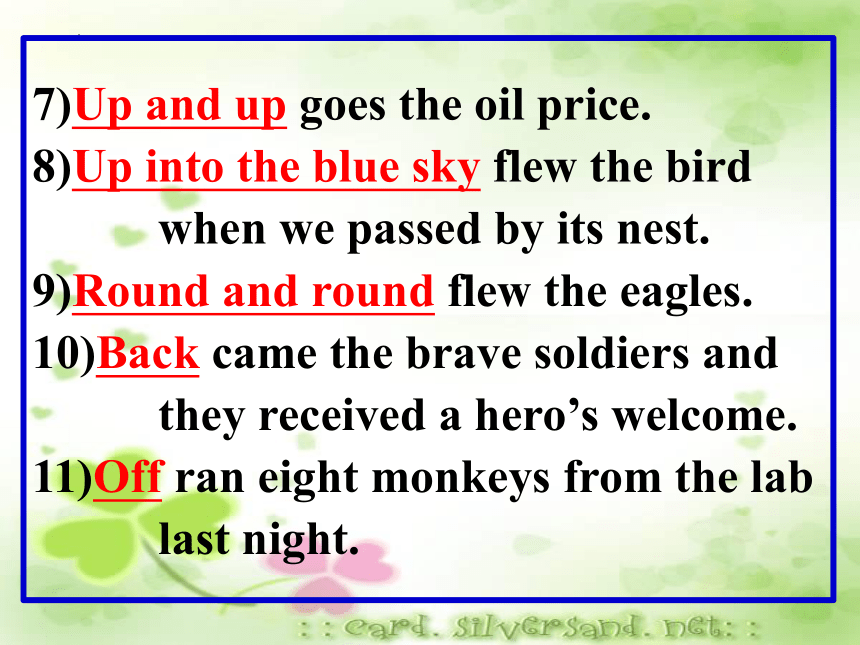
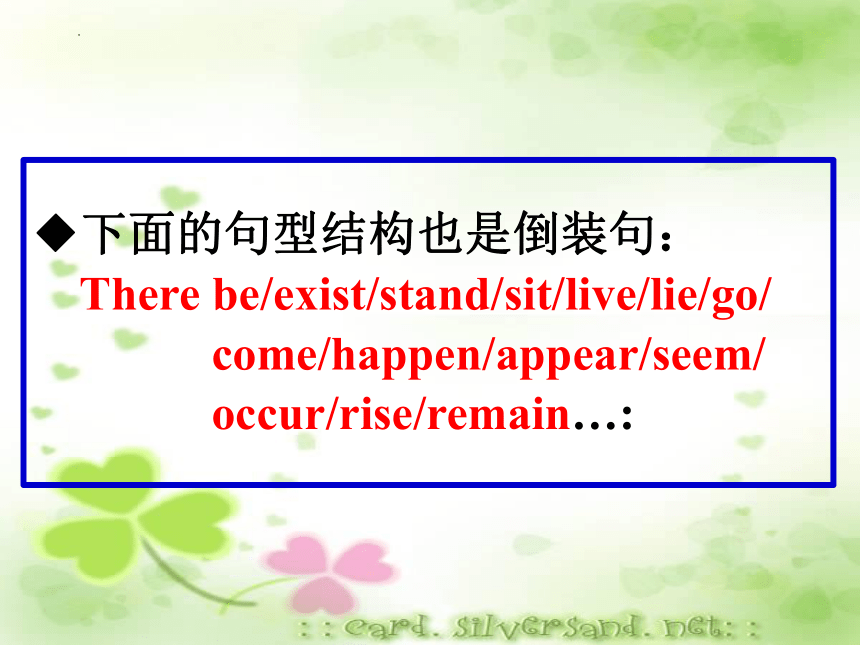
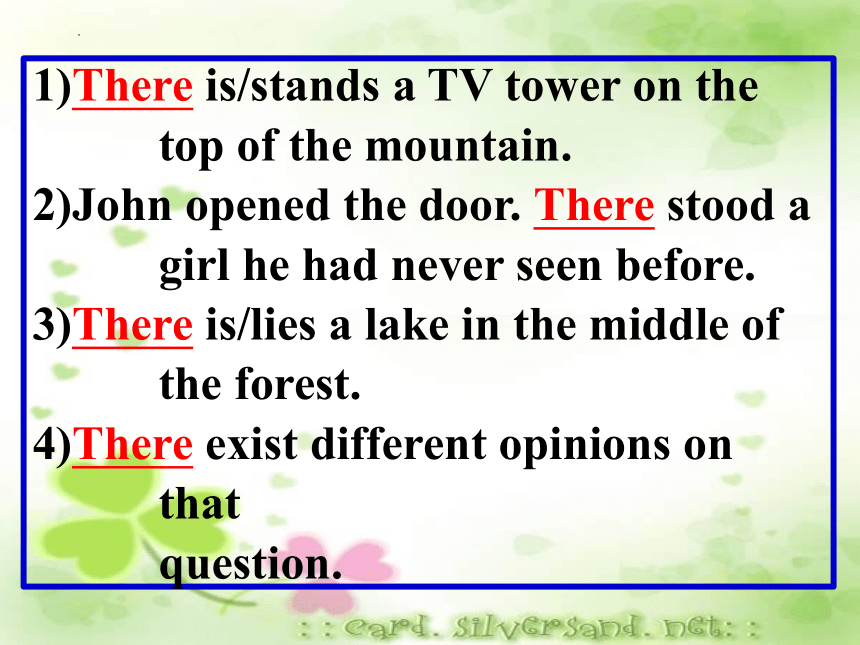
文档简介
(共82张PPT)
英语高考必考语法
倒 装 句
The Inversion
主语和谓语是句子的核心,它们之间有
两种语序:
①主语在谓语之前称为自然语序 (Natural
Order);
②主语在谓语或者助动词情态动词之后
则称为倒装语序(Inverted Order)。
倒装语序又有完全倒装(Full Inversion)和
部分倒装(Partial Inversion):
完全倒装: 又称全部倒装, 是指将句子中的谓语全部置于主语之前。此种倒装通常用于一般现在时和一般过去时。
部分倒装: 就是将谓语的一部分(如be/do/does/
did/have/has/had/will/shall/can/should等)放在主语前。部分倒装也就是一般疑问句语序。
为什么要用倒装句呢?
①表示“强调”; ②句型需要。
倒装句用法(一)
here, there, in, out, back, up, down, away, off, round等副词位于句首,主语又是名词时, 句子通常用全部倒装。但主语如果是代词时, 句子则不倒装。这种用法的谓语动词常常是come, go, run, rush, fall, fly, follow等。
1)Two apples fell down from the tree
just now.
→ Down fell two apples from the tree just now.
2)The thief ran away the moment he
saw the policemen.
→ Away ran the thief the moment he saw the policemen.
●He rushed out, with a sharp knife in his hand.
→Out he rushed, with a sharp knife in his hand.
3)There goes the bell. 铃响了。
4)There/Here comes the last bus.
最后一趟公共汽车来了。
5)Look, here comes your dream girl.
6)In came the headmaster and the meeting began.
7)Up and up goes the oil price.
8)Up into the blue sky flew the bird when we passed by its nest.
9)Round and round flew the eagles.
10)Back came the brave soldiers and
they received a hero’s welcome.
11)Off ran eight monkeys from the lab last night.
◆下面的句型结构也是倒装句:
There be/exist/stand/sit/live/lie/go/
come/happen/appear/seem/
occur/rise/remain…:
1)There is/stands a TV tower on the top of the mountain.
2)John opened the door. There stood a girl he had never seen before.
3)There is/lies a lake in the middle of
the forest.
4)There exist different opinions on that
question.
倒装句用法(二)
下列否定词/短语 not, seldom, never, nor,
little, rarely, nowhere, hardly, scarcely,
barely, no longer, at no time = in no way/
case/sense = by no means = on no account
= in/under no circumstance =on/under no condition(决不;绝不) 在句首时, 句子要用部分倒装。
●in no time: 立刻; 马上。
在句首时, 句子不倒装。
●little: 毫不; 一点也不。用在think,
imagine, know, realize, undersatand等前面。
● never, not 置于句首时通常要把句子
的状语或者宾语也一同提前, 然后句子
再进行倒装。
1)We have never seen such a wonderful feast before.
→Never before have we seen such a wonderful feast.
2)I have never felt so happy in all my
life.
→Never in all my life have I felt so happy.
3)He did not miss an English class once
last semester.
→Not once did he miss an English class last semester.
4)She didn’t sing a single song at yesterday’s party.
→Not a single song did she sing at yesterday’s party.
5)He did not begin to know how important the family was for him until he left his home.
→Not until he left his home did he begin to know how important the family was for him.
6)The woman should on no condition
be taken to the hospital.
→On no condition should the woman be taken to the hospital.
7)Peter is clever. He studies very hard.
→Not only is Peter clever, but he
also studies very hard.
8)Not only do the nurses want a pay increase, they want reduced
hours as well.
9)New technology was used in teaching. As a result, not only was teachers’ energy saved, but students became more interested in the lessons.
10)They went into a small house but
not a person did they find.
11)I’ve tried very hard to improve my English. But by no means is the teacher satisfied with my progress.
12)The professor warned the students that on no account should they
use mobile phones in his class.
13)Nowhere in the world can you find such a beautiful city like Dalian.
14)We laugh at jokes, but seldom do
we think about how they work.
15)Little did Rose care about her own safety, though she was in great danger herself.
16)In no country other than Britain, can one experience four seasons in the course of a single day.
17)No longer does your cousin live here.
18)Rarely/Seldom have I seen such a
beautiful sunset/sunrise.
19)At no time did they actually break
the rules of the game. It was unfair to punish them.
◆20)In no time I worked out the maths problem.
一…...就…...
no sooner…than…
= hardly/scarcely/barely/rarely…
when/before…
上面两个结构的前句用过去完成时,后句用一般过去时。如果把 hardly/
scarcely/barely/rarely或者no sooner提到句首, 前句要用部分倒装。在第二个结构中, when比before更常见。
1)The mouse had hardly come out of
the hole when the cat caught it.
→ Hardly had the mouse come out of
the hole when the cat caught it.
2)He had no sooner finished his speech than the students started cheering.
→ No sooner had he finished his speech than the students started cheering.
3)Hardly/Scarcely had I sat down at the table when the telephone rang again.
4)Hardly had she arrived before she had to go back.
5)No sooner had Mo Yan stepped on
the stage than the audience broke into thunderous applause.
倒装句用法(三)
表示前面所述的情况也适用于另外的人或事物时要用so/as/neither/nor式倒装。前面是肯定句时用so/as式倒装, 前面是否定句时用neither/nor式倒装。此种倒装是部分倒装。
1)Jim plays basketball every afternoon, as/so does his sister.
2)They helped the farmers get in rice
last Sunday, as/so did we.
3)You have made a great contribution
to the country, and so has she/he.
4)Alice is now preparing for her final exams; so am I.
5)---It’s burning hot today, isn’t it
---Yes. So was it yesterday.
6)Mike hasn’t finished his homework, neither/nor has Tom.
7)Your campus isn’t dirty, neither/nor
is theirs.
8)They don’t have any classes at the weekend. Nor/Neither do we/you.
9)Bill wasn’t happy about the delay of the report by Jason, and neither was I/she.
10)If you don’t go to the exhibition, nor/ neither will I/he/she.
11)After that we never saw her again, nor/neither did we hear from her.
12)Neither has he called on her, nor
will he do so.
13)---Do you know Jim quarreled with
his brother
---I don’t know, nor do I care.
倒装句用法(四)
so/such… that…: 如此…以致… 在上面的主从复合句中, 如果把so/
such…部分放在句首, 主句要用部分倒装。
1)She is so hungry and tired that she
can walk no farther.
→ So hungry and tired is she that she can walk no farther.
2)He is such a good child that you will like him.
→ Such a good child is he that you will like him.
3)So sudden was the attack that the enemy had no time to escape.
4)So successful was her business that Mary was able to set up new branches elsewhere.
5)So loudly did the students read the
English language that people
in the street could hear them.
6)So much of interest does Beijing offer that most visitors simply run out
of time before seeing it all.
7)Such good weather is it that we all want to go out for a walk.
8)Such great progress has he made that
his parents are satisfied with him.
9)Such a famous film star is she that everyone wants to take a photo with her.
倒装句用法(五)
地点状语介词短语, 进行时的现在分词, 被动语态的过去分词在句首
时, 句子要倒装。
1)Your daughter is sleeping under the tree.
→Sleeping under the tree is your daughter.
2)French is spoken in France.
→Spoken in France is French.
3)A group of farmers are seated on the ground.
→Seated on the ground are a group
of farmers.
4)In the dark forests lie/are many lakes, some large enough to hold several English towns.
5)Between the two mounts lies a very deep valley and they decide to
build a ropeway.
6)Travelling with Mr. Brown will be
190 other teenagers.
7)Hidden behind the door were some naughty children.
◆注意下面几句在倒装句时用一般
现在时, 在正常语序时用现在进
行时。
1)There goes the bell.
= The bell is ringing. 铃响了。
2)There/Here comes the bus.
= The bus is coming.
公共汽车来了。
3)Look, here/there comes your dream girl.
= Look, your dream girl is coming.
4)Between the two windows hangs a photo of her grandparents.
= A photo of her grandparents is hanging between the two windows.
倒装句用法(六)
有时为了强调表语, 也为了避免
句子头重脚轻, 就需把表语提到句
首, 这样句子就要倒装。
1)Present at the press conference were Premier Li and six ministers.
2)Very important in the fishermen’s life
is the TV weather forcast.
3)Such was Yuan Longping, a simple man of great achievements in
agriculture.
4)Among the speakers is our president, Thomas Brown.
5)South of the famous university is a very large beautiful park.
6)In front of the temple stand two tall
old trees.
7)Gone are the days when they could
do what they liked to China.
倒装句用法(七)
as 式让步状语从句的倒装:
as的意思是“虽然”时, 要把它引导的让步状语从句的一部分提到句首, 这时的as可改为 though/that, 但不可以改为although。though引导的句子
也可以不倒装。注意: 如果提前的
是单数名词, 不可在名词前加冠词。
1)Busy as they are, they can fulfill the task ahead of time.
2)Strange as it might sound, his idea
was accepted by all the people
at the meeting.
3)Hot as the night air was, we slept
deeply because we were so
tired after the long journey.
4)Unsatisfied though he was with the payment, he took the job just
to get some work experience.
5)Child as she is, she knows quite a lot about the history of Europe.
6)Quiet student as he may be, he talks
a lot about his favorite singers after class.
7)Hard as they study, they often fail in the tests.
8)Much as I admire his courage in the face of danger, I don’t think he acted wisely.
9)Try as she might, Susan couldn’t get the door open.
10)Dislike him as we may, we must acknowledge that he is more
intelligent than us.
11)Fail in the election as she did, she became famous all over the world.
12)Raining hard as it is, they are going hiking.
13)Surrounded as they were by the enemy, they managed to fight their way out.
倒装句用法(八)
only 强调状语(从句)在句首时,
句子要用部分倒装。注意: 如果强调的是状语从句, 倒装的不是此从句, 而是从句后的主句。
1)Only in this way can you make progress in your studies.
2)Only by working hard will we lead a good life.
3)Only then/yesterday did she realize how much damage had been caused.
4)Only recently have we allowed ourselves to watch TV.
5)Only through your efforts have we
raised enough money for the
project.
6)Only after the war will they withdraw their troops from the border.
7)Only after they had discussed the matter for two hours, did they reach a decision.
8)Only when you can find peace in your heart will you keep good relationships with others.
9)Only because he got the flu, he didn’t
attend school last week.
10)Only since they gave up that good
chance have they had no chance
to show their invention again.
11)Only if you eat the correct foods,
will you be able to keep fit and stay healthy.
●only强调主语时,句子不倒装;强调宾语时, 句子不倒装。但偶尔也有倒装的情况。
1)Only teachers can borrow dictionaries from the library. 【强调主语 】
2)After the patients went into the office, only a doctor they saw working.
3)---He has been working so hard lately.
---I can see that. Only a few mistakes he made in the maths exam.
【第二、三句是强调宾语】
4)Only four ships the policemen saw at the harbor.
5)Only four ships did the policemen see at the harbor.
倒装句用法(九)
当if虚拟条件句的谓语部分含有were、should、had时,我们可以将连词if省略掉,而将were、should、had置于句首构成倒装句。如果if
句子是否定句, not要放在主语后。
1)If he were my son, I would suggest
a different plan.
→Were he my son, I would suggest a different plan.
2)If she had learnt about the computer,
we would have hired her to work here.
→Had she learnt about the computer,
we would have hired her to work here.
3)If I should have 1,000,000 pounds, I
would buy a good car.
→Should I have 1,000,000 pounds, I
would buy a good car.
4)If it were to snow tomorrow, they would go skiing.
→Were it to snow tomorrow, they would go skiing.
5)If it were not for the bad weather, we would go for a picnic.
【If it were not for…: 要不是。
对现在或者将来的假设。】
→Were it not for the bad weather, we would go for a picnic.
6)If it had not been for the free tickets,
I would not have gone to the films so often.
【If it hadn’t been for…: 要不是。
对过去的假设。 】
→Had it not been for the free tickets,
I would not have gone to the films so often.
7)Were there no modern telecommunications, we would have to wait for months or years to get news from around the world.
倒装句用法(十)
well, often, always, now, then, thus, many a time, now and then, every other day, every two days, once in a while 等在句首, 且表示强调时, 句子要倒装, 但若不表强调, 有的句
子也可不倒装。
1)Well do I remember the day when I got paid for the first time.
2)Well did she know him and well did he know her.
3)Often do we warn the United States not to sell advanced weapons to Taiwan.
4)Many a time have they given us help and support.
5)The Anti-Japanese War ended in 1945. Then followed China’s Liberation War.
6)We have been on duty for ten hours and now comes your turn.
7)Thus ended/began the 2022 Beijing Winter Olympic Games.
8)Always does the boy go swimming
in the river alone.
9)Now and then did the man go out to see what his son was doing.
10)Every other day does the girl go to the countryside to see her grandparents.
倒装句用法(十一)
下面两句是倒装句:
1)Long live the People’s Republic of China!
【long live:万岁】
2)May you have a good journey!
【may:祝】
倒装句用法(十二)
下面的句型也被认为是倒装句:
1)However late he comes back, Mother will wait for him to have dinner together.
【让步状语从句】
=No matter how late he comes back, Mother will wait for him to have dinner together.
2)The fresher the vegetables are, the more expensive they are.
3)The longer the war lasts, the more
the people there will suffer.
4)What good weather we have been having these days! 【感叹句】
5)How hard all the doctors and nurses are working! 【感叹句】
6)You can’t imagine how excited they were when they received these nice Christmas presents.
7)The shocking news made me realize what terrible problems we would face.
【第6)句和第7)句是感叹句作宾语从句】
Thanks for your watching !
英语高考必考语法
倒 装 句
The Inversion
主语和谓语是句子的核心,它们之间有
两种语序:
①主语在谓语之前称为自然语序 (Natural
Order);
②主语在谓语或者助动词情态动词之后
则称为倒装语序(Inverted Order)。
倒装语序又有完全倒装(Full Inversion)和
部分倒装(Partial Inversion):
完全倒装: 又称全部倒装, 是指将句子中的谓语全部置于主语之前。此种倒装通常用于一般现在时和一般过去时。
部分倒装: 就是将谓语的一部分(如be/do/does/
did/have/has/had/will/shall/can/should等)放在主语前。部分倒装也就是一般疑问句语序。
为什么要用倒装句呢?
①表示“强调”; ②句型需要。
倒装句用法(一)
here, there, in, out, back, up, down, away, off, round等副词位于句首,主语又是名词时, 句子通常用全部倒装。但主语如果是代词时, 句子则不倒装。这种用法的谓语动词常常是come, go, run, rush, fall, fly, follow等。
1)Two apples fell down from the tree
just now.
→ Down fell two apples from the tree just now.
2)The thief ran away the moment he
saw the policemen.
→ Away ran the thief the moment he saw the policemen.
●He rushed out, with a sharp knife in his hand.
→Out he rushed, with a sharp knife in his hand.
3)There goes the bell. 铃响了。
4)There/Here comes the last bus.
最后一趟公共汽车来了。
5)Look, here comes your dream girl.
6)In came the headmaster and the meeting began.
7)Up and up goes the oil price.
8)Up into the blue sky flew the bird when we passed by its nest.
9)Round and round flew the eagles.
10)Back came the brave soldiers and
they received a hero’s welcome.
11)Off ran eight monkeys from the lab last night.
◆下面的句型结构也是倒装句:
There be/exist/stand/sit/live/lie/go/
come/happen/appear/seem/
occur/rise/remain…:
1)There is/stands a TV tower on the top of the mountain.
2)John opened the door. There stood a girl he had never seen before.
3)There is/lies a lake in the middle of
the forest.
4)There exist different opinions on that
question.
倒装句用法(二)
下列否定词/短语 not, seldom, never, nor,
little, rarely, nowhere, hardly, scarcely,
barely, no longer, at no time = in no way/
case/sense = by no means = on no account
= in/under no circumstance =on/under no condition(决不;绝不) 在句首时, 句子要用部分倒装。
●in no time: 立刻; 马上。
在句首时, 句子不倒装。
●little: 毫不; 一点也不。用在think,
imagine, know, realize, undersatand等前面。
● never, not 置于句首时通常要把句子
的状语或者宾语也一同提前, 然后句子
再进行倒装。
1)We have never seen such a wonderful feast before.
→Never before have we seen such a wonderful feast.
2)I have never felt so happy in all my
life.
→Never in all my life have I felt so happy.
3)He did not miss an English class once
last semester.
→Not once did he miss an English class last semester.
4)She didn’t sing a single song at yesterday’s party.
→Not a single song did she sing at yesterday’s party.
5)He did not begin to know how important the family was for him until he left his home.
→Not until he left his home did he begin to know how important the family was for him.
6)The woman should on no condition
be taken to the hospital.
→On no condition should the woman be taken to the hospital.
7)Peter is clever. He studies very hard.
→Not only is Peter clever, but he
also studies very hard.
8)Not only do the nurses want a pay increase, they want reduced
hours as well.
9)New technology was used in teaching. As a result, not only was teachers’ energy saved, but students became more interested in the lessons.
10)They went into a small house but
not a person did they find.
11)I’ve tried very hard to improve my English. But by no means is the teacher satisfied with my progress.
12)The professor warned the students that on no account should they
use mobile phones in his class.
13)Nowhere in the world can you find such a beautiful city like Dalian.
14)We laugh at jokes, but seldom do
we think about how they work.
15)Little did Rose care about her own safety, though she was in great danger herself.
16)In no country other than Britain, can one experience four seasons in the course of a single day.
17)No longer does your cousin live here.
18)Rarely/Seldom have I seen such a
beautiful sunset/sunrise.
19)At no time did they actually break
the rules of the game. It was unfair to punish them.
◆20)In no time I worked out the maths problem.
一…...就…...
no sooner…than…
= hardly/scarcely/barely/rarely…
when/before…
上面两个结构的前句用过去完成时,后句用一般过去时。如果把 hardly/
scarcely/barely/rarely或者no sooner提到句首, 前句要用部分倒装。在第二个结构中, when比before更常见。
1)The mouse had hardly come out of
the hole when the cat caught it.
→ Hardly had the mouse come out of
the hole when the cat caught it.
2)He had no sooner finished his speech than the students started cheering.
→ No sooner had he finished his speech than the students started cheering.
3)Hardly/Scarcely had I sat down at the table when the telephone rang again.
4)Hardly had she arrived before she had to go back.
5)No sooner had Mo Yan stepped on
the stage than the audience broke into thunderous applause.
倒装句用法(三)
表示前面所述的情况也适用于另外的人或事物时要用so/as/neither/nor式倒装。前面是肯定句时用so/as式倒装, 前面是否定句时用neither/nor式倒装。此种倒装是部分倒装。
1)Jim plays basketball every afternoon, as/so does his sister.
2)They helped the farmers get in rice
last Sunday, as/so did we.
3)You have made a great contribution
to the country, and so has she/he.
4)Alice is now preparing for her final exams; so am I.
5)---It’s burning hot today, isn’t it
---Yes. So was it yesterday.
6)Mike hasn’t finished his homework, neither/nor has Tom.
7)Your campus isn’t dirty, neither/nor
is theirs.
8)They don’t have any classes at the weekend. Nor/Neither do we/you.
9)Bill wasn’t happy about the delay of the report by Jason, and neither was I/she.
10)If you don’t go to the exhibition, nor/ neither will I/he/she.
11)After that we never saw her again, nor/neither did we hear from her.
12)Neither has he called on her, nor
will he do so.
13)---Do you know Jim quarreled with
his brother
---I don’t know, nor do I care.
倒装句用法(四)
so/such… that…: 如此…以致… 在上面的主从复合句中, 如果把so/
such…部分放在句首, 主句要用部分倒装。
1)She is so hungry and tired that she
can walk no farther.
→ So hungry and tired is she that she can walk no farther.
2)He is such a good child that you will like him.
→ Such a good child is he that you will like him.
3)So sudden was the attack that the enemy had no time to escape.
4)So successful was her business that Mary was able to set up new branches elsewhere.
5)So loudly did the students read the
English language that people
in the street could hear them.
6)So much of interest does Beijing offer that most visitors simply run out
of time before seeing it all.
7)Such good weather is it that we all want to go out for a walk.
8)Such great progress has he made that
his parents are satisfied with him.
9)Such a famous film star is she that everyone wants to take a photo with her.
倒装句用法(五)
地点状语介词短语, 进行时的现在分词, 被动语态的过去分词在句首
时, 句子要倒装。
1)Your daughter is sleeping under the tree.
→Sleeping under the tree is your daughter.
2)French is spoken in France.
→Spoken in France is French.
3)A group of farmers are seated on the ground.
→Seated on the ground are a group
of farmers.
4)In the dark forests lie/are many lakes, some large enough to hold several English towns.
5)Between the two mounts lies a very deep valley and they decide to
build a ropeway.
6)Travelling with Mr. Brown will be
190 other teenagers.
7)Hidden behind the door were some naughty children.
◆注意下面几句在倒装句时用一般
现在时, 在正常语序时用现在进
行时。
1)There goes the bell.
= The bell is ringing. 铃响了。
2)There/Here comes the bus.
= The bus is coming.
公共汽车来了。
3)Look, here/there comes your dream girl.
= Look, your dream girl is coming.
4)Between the two windows hangs a photo of her grandparents.
= A photo of her grandparents is hanging between the two windows.
倒装句用法(六)
有时为了强调表语, 也为了避免
句子头重脚轻, 就需把表语提到句
首, 这样句子就要倒装。
1)Present at the press conference were Premier Li and six ministers.
2)Very important in the fishermen’s life
is the TV weather forcast.
3)Such was Yuan Longping, a simple man of great achievements in
agriculture.
4)Among the speakers is our president, Thomas Brown.
5)South of the famous university is a very large beautiful park.
6)In front of the temple stand two tall
old trees.
7)Gone are the days when they could
do what they liked to China.
倒装句用法(七)
as 式让步状语从句的倒装:
as的意思是“虽然”时, 要把它引导的让步状语从句的一部分提到句首, 这时的as可改为 though/that, 但不可以改为although。though引导的句子
也可以不倒装。注意: 如果提前的
是单数名词, 不可在名词前加冠词。
1)Busy as they are, they can fulfill the task ahead of time.
2)Strange as it might sound, his idea
was accepted by all the people
at the meeting.
3)Hot as the night air was, we slept
deeply because we were so
tired after the long journey.
4)Unsatisfied though he was with the payment, he took the job just
to get some work experience.
5)Child as she is, she knows quite a lot about the history of Europe.
6)Quiet student as he may be, he talks
a lot about his favorite singers after class.
7)Hard as they study, they often fail in the tests.
8)Much as I admire his courage in the face of danger, I don’t think he acted wisely.
9)Try as she might, Susan couldn’t get the door open.
10)Dislike him as we may, we must acknowledge that he is more
intelligent than us.
11)Fail in the election as she did, she became famous all over the world.
12)Raining hard as it is, they are going hiking.
13)Surrounded as they were by the enemy, they managed to fight their way out.
倒装句用法(八)
only 强调状语(从句)在句首时,
句子要用部分倒装。注意: 如果强调的是状语从句, 倒装的不是此从句, 而是从句后的主句。
1)Only in this way can you make progress in your studies.
2)Only by working hard will we lead a good life.
3)Only then/yesterday did she realize how much damage had been caused.
4)Only recently have we allowed ourselves to watch TV.
5)Only through your efforts have we
raised enough money for the
project.
6)Only after the war will they withdraw their troops from the border.
7)Only after they had discussed the matter for two hours, did they reach a decision.
8)Only when you can find peace in your heart will you keep good relationships with others.
9)Only because he got the flu, he didn’t
attend school last week.
10)Only since they gave up that good
chance have they had no chance
to show their invention again.
11)Only if you eat the correct foods,
will you be able to keep fit and stay healthy.
●only强调主语时,句子不倒装;强调宾语时, 句子不倒装。但偶尔也有倒装的情况。
1)Only teachers can borrow dictionaries from the library. 【强调主语 】
2)After the patients went into the office, only a doctor they saw working.
3)---He has been working so hard lately.
---I can see that. Only a few mistakes he made in the maths exam.
【第二、三句是强调宾语】
4)Only four ships the policemen saw at the harbor.
5)Only four ships did the policemen see at the harbor.
倒装句用法(九)
当if虚拟条件句的谓语部分含有were、should、had时,我们可以将连词if省略掉,而将were、should、had置于句首构成倒装句。如果if
句子是否定句, not要放在主语后。
1)If he were my son, I would suggest
a different plan.
→Were he my son, I would suggest a different plan.
2)If she had learnt about the computer,
we would have hired her to work here.
→Had she learnt about the computer,
we would have hired her to work here.
3)If I should have 1,000,000 pounds, I
would buy a good car.
→Should I have 1,000,000 pounds, I
would buy a good car.
4)If it were to snow tomorrow, they would go skiing.
→Were it to snow tomorrow, they would go skiing.
5)If it were not for the bad weather, we would go for a picnic.
【If it were not for…: 要不是。
对现在或者将来的假设。】
→Were it not for the bad weather, we would go for a picnic.
6)If it had not been for the free tickets,
I would not have gone to the films so often.
【If it hadn’t been for…: 要不是。
对过去的假设。 】
→Had it not been for the free tickets,
I would not have gone to the films so often.
7)Were there no modern telecommunications, we would have to wait for months or years to get news from around the world.
倒装句用法(十)
well, often, always, now, then, thus, many a time, now and then, every other day, every two days, once in a while 等在句首, 且表示强调时, 句子要倒装, 但若不表强调, 有的句
子也可不倒装。
1)Well do I remember the day when I got paid for the first time.
2)Well did she know him and well did he know her.
3)Often do we warn the United States not to sell advanced weapons to Taiwan.
4)Many a time have they given us help and support.
5)The Anti-Japanese War ended in 1945. Then followed China’s Liberation War.
6)We have been on duty for ten hours and now comes your turn.
7)Thus ended/began the 2022 Beijing Winter Olympic Games.
8)Always does the boy go swimming
in the river alone.
9)Now and then did the man go out to see what his son was doing.
10)Every other day does the girl go to the countryside to see her grandparents.
倒装句用法(十一)
下面两句是倒装句:
1)Long live the People’s Republic of China!
【long live:万岁】
2)May you have a good journey!
【may:祝】
倒装句用法(十二)
下面的句型也被认为是倒装句:
1)However late he comes back, Mother will wait for him to have dinner together.
【让步状语从句】
=No matter how late he comes back, Mother will wait for him to have dinner together.
2)The fresher the vegetables are, the more expensive they are.
3)The longer the war lasts, the more
the people there will suffer.
4)What good weather we have been having these days! 【感叹句】
5)How hard all the doctors and nurses are working! 【感叹句】
6)You can’t imagine how excited they were when they received these nice Christmas presents.
7)The shocking news made me realize what terrible problems we would face.
【第6)句和第7)句是感叹句作宾语从句】
Thanks for your watching !
